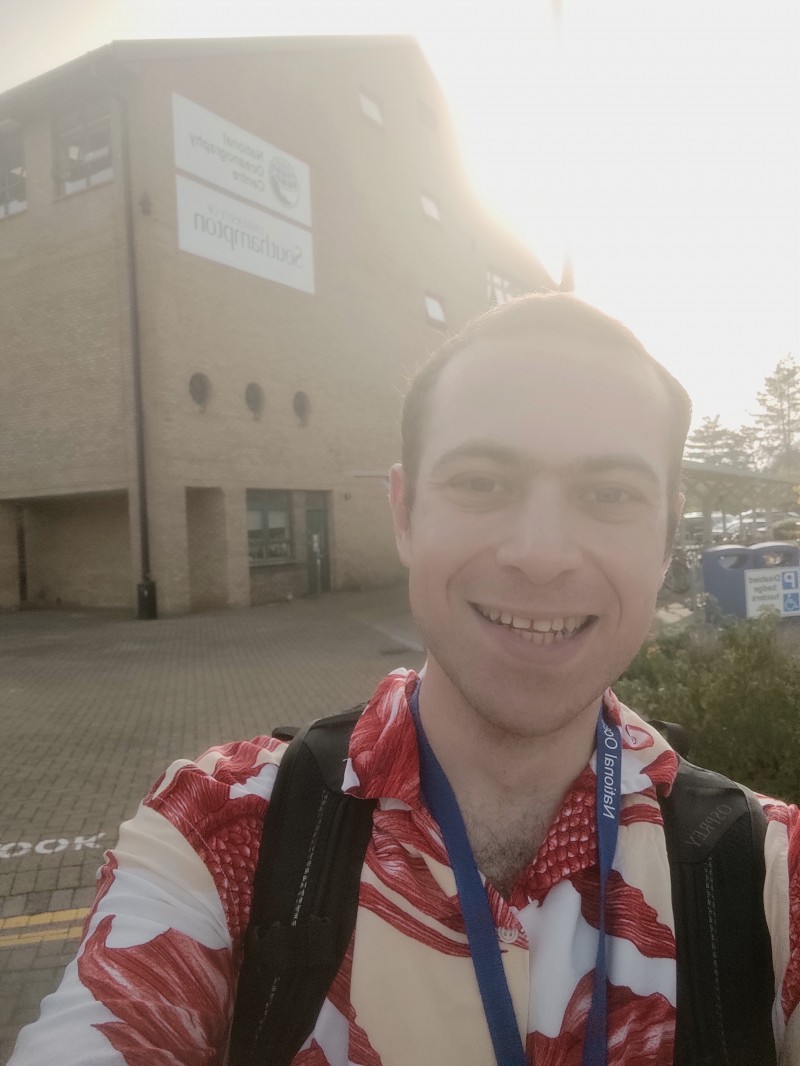Challenger Society Ocean Modelling SIG Meeting
Noam Vogt-Vincent
University of Oxford

Caption: An excessively hot and sunny day at NOCS!
The Ocean Modelling SIG holds its meeting every September, for ocean modellers (particularly early career scientists) across the UK. Ocean Modelling was actually the first scientific meeting I ever attended (back in 2018, presenting some undergraduate summer project work) and it has always been a great forum to learn about the status of ocean modelling research in the UK, so I wanted to make sure I was able to attend before leaving the UK later this year.
Caption: Finishing touches on my presentation on the train down from London
Ocean Modelling was hosted at NOC Southampton this year and, as always, a broad range of exciting research was presented (from the seasonality of Southern Ocean ventilation, to the practicality of ocean alkalinity enhancement by spreading olivine on beaches). One of my favourite talks this year was Julia Rulent’s assessment of pollutant dispersal from a major shipwreck off the coast of Sri Lanka, finding that the environmental impacts of this marine disaster could have been significantly worse if the accident took place during a different monsoon phase (as well as the challenges of investigating an incident under active litigation!).
I presented recent findings from my PhD research, on the connectivity of coral reefs in the southwest Indian Ocean, and how this may influence the evolutionary adaptation of corals to warming over the coming centuries. This research is very much on the biological-end of what is presented at Ocean Modelling, but I got plenty of interesting questions, and enjoyed follow-on discussions with others working on marine dispersal.
Caption: Presenting my PhD research at the Ocean Modelling SIG Meeting (image credit: Helen Johnson)
In summary, this year’s Ocean Modelling was an enjoyable and productive meeting (as always!) and I am very grateful to the Challenger Society for enabling me to attend and present my PhD work.
Profile
Noam Vogt-Vincent
I just completed my DPhil (PhD) in the Department of Earth Sciences at the University of Oxford, principally supervised by Professor Helen Johnson. My DPhil thesis was titled Marine dispersal in the western Indian Ocean (focusing on the dispersal of marine plastic pollution around remote islands, and the connectivity of coral reefs) and my main research interest is the interaction between coral reef systems and the physical marine environment (past, present, and future). Later this year, I will be taking up a NOAA Climate & Global Change Postdoctoral Fellowship at the Hawai’i Institute of Marine Biology, where I intend to continue my research into the response of our tropical coral reefs to future climate change.
Latest News
Royal Society Publishing Photography Competition 2025
Please see a message from the Royal Society below:
We are delighted to announce that the 2025 Competition is now open for entries until 15 August for a chance to win £1000! The competition celebrates the power of photography in conveying the wonder of science happening all around us and photographs can be submitted in the categories of: Astronomy, Behaviour, Earth Science and Climatology, Ecology and Environmental Science, and Microimaging.
The competition is free to enter and open to anyone studying or working in science at graduate level or above. Category winners will receive a one-year membership to the Royal Photographic Society and the overall winner will receive a grand prize of £1,000. Find out more: https://bit.ly/RSPphotocomp
October 2025 MEDIN Workshop: Marine Data Management, Governance and the MEDIN toolset
The Marine Environmental Data and Information Network (MEDIN) are pleased to announce that registration is now open for the next occurrence of our popular free online training workshop: ‘Marine Data Management, Governance and the MEDIN toolset’ on the 13th – 17th October 2025 on OceanTeacher Global Academy.
Marine Data Management, Governance and the MEDIN toolset
The Marine Environmental Data and Information Network (MEDIN) and OceanWise are delighted to invite you to attend our popular free online training workshop: ‘Marine Data Management, Governance and the MEDIN toolset’ on the 19th – 23rd of May 2025.
